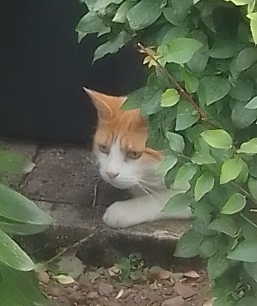Sally Jenkins's Blog, page 9
December 16, 2022
Eating for Prediabetes
Disclaimer: I am not a medical professional: this blog post is written based on my own personal experience.
In October 2022 I had a routine blood test and two days later was told that I have prediabetes. According to Diabetes.org.uk: Prediabetes means that your blood sugars are higher than usual, but not high enough for you to be diagnosed with type 2 diabetes. It also means that you are at high risk of developing type 2 diabetes. You are unlikely to be experiencing any symptoms with prediabetes. Prediabetes is also sometimes called borderline diabetes.
Type 2 diabetes happens because insulin can’t work properly, so your blood sugar levels keep rising. This means more insulin is released. For some people with type 2 diabetes this can eventually tire the pancreas out, meaning their body makes less and less insulin. This can lead to even higher blood sugar levels.
Prediabetes is a warning that if you don’t change your diet, you are likely to develop full-blown type 2 diabetes.
Myth: Only fat people get type 2 diabetes.
I have a low BMI and am very active. When I saw the nurse, to be advised on my new diet, she weighed me and told me not to lose any weight.
My new diet is supposed to be low on carbohydrates and sugar but high in protein and fats, with an emphasis on ‘good’ fats such as those found in avocadoes, oily fish and nuts. The nurse impressed upon me that I must remove as much carbohydrate and sugar from my diet as possible. It’s taken some getting used to because I thought my previous diet was healthy.
Breakfast cereal is now off limits. I used to have a bowl of bran flakes plus a Weetabix followed by two slices of toast and marmalade. However, I weighed the cereal I used to eat and it was double the suggested serving of bran flakes plus there was the Weetabix – and it all contains sugars. The nurse suggested a cooked breakfast or lots of full fat Greek yoghurt plus nuts and seeds.
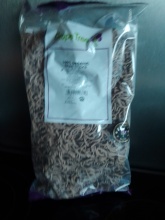
Grape Tree Bran Sticks
My compromise – I’ve ditched the bran flakes and Weetabix and replaced it with 15g of bran sticks from Grape Tree plus some nuts, seeds, dried coconut and some berries. I soak it in milk overnight and it tastes fine. I still have toast but have ditched the marmalade, instead I have either a fried egg, avocado, cheese or sugar free peanut butter on top.
At lunchtime my staple used to be two wholemeal rolls with cottage cheese and tomatoes. I started the new diet by replacing one roll with homemade coleslaw. Now I sometimes don’t have any bread at all. Instead, I have a large serving of coleslaw plus cheese or sardines (in tomato sauce) or chicken plus nuts, tomatoes and whatever else is in the fridge.
The evening meal is the hardest because it always included potatoes or pasta or rice etc. The nurse suggested mashed cauliflower instead of potatoes and it is nice. I’ve been reading various diabetic recipe books and some of the recipes turn out well, others are a bit insipid. And sometimes I do have to let the carbs back in but with the reduction in breakfast and lunchtime carbs, that’s probably OK.
I mostly say ‘no’ to cakes and sweets but fear that will waver over Christmas! The hardest thing is not knowing whether I have adapted my diet enough or too much or whether I need to do more. My GP won’t check again until October 2023.
By the way, I tried making diabetic carrot cake – it wasn’t good. I think the best policy is not to create no-sugar versions of favourite cakes but to have a little bit of the real thing very occasionally. My cauliflower and corned beef hash turned out well though. The experiments continue …
If anybody’s got any tips or tricks, I’d love to hear them!
November 29, 2022
Life Coaching Benefits
Earlier this year I was feeling despondent about my writing. Over the previous three years I’d had the excitement of securing an agent, working with her on two books and then the subsequent deep disappointment when none of her submissions to the big publishers were successful. The whole act of writing seemed a fool’s game: the short story market was shrinking, publishers preferred to invest in well-known names to guarantee book sales and, during lockdown, everyone seemed to have become a writer. I was on the verge of giving up. Then, on social media, I discovered trainee life coach, Elizabeth Scott. I explained that I was at a crossroads in my writing career and didn’t know how to move forward or whether to give up completely. Elizabeth offered me three virtual coaching sessions.
Did the sessions work?

Elizabeth Scott
Yes. Elizabeth didn’t offer direct advice on what to do. She didn’t give her opinion on whether I should stop writing and do something more rewarding and less frustrating instead. She didn’t judge whether I was any good at writing.
Instead, she encouraged me to think in a different way. For example, she asked me to draw a circle and put into it the different aspects of my life: work, family, writing, exercise etc. Then she asked what I would like to remove or decrease in that circle and what I wanted to spend more time on. I found that I couldn’t get rid of writing and said that, in a perfect world, I would like to spend more time writing. We talked about NaNoWriMo because in the past that has triggered a burst of enthusiasm for writing. But starting a new novel, after all the disappointments, didn’t appeal. I mentioned the possibility, instead, of drafting one short story a day during November – as long as I had a list of thirty ideas before November 1st. But still I wasn’t sure I wanted to go ahead.
“How will you feel if you don’t take on this challenge?” Elizabeth asked.
“Disappointed in myself for just drifting.”
“How will you feel if you do the challenge?”
“Pleased with myself.”
I had my answer. We agreed that I would begin to find ideas and report back to Elizabeth at our next session. Knowing that I had to report back acted as a great incentive for me and I generated thirty ideas. At the next session I mentioned to Elizabeth that I now needed to find the discipline to force myself to sit down and write these stories.
“‘Discipline’ and ‘force’ are harsh words,” she said. “Try using the word ‘habit’ instead.”
She was right. Saying that I now needed to make writing a habit sounded much more achievable.
Sometimes a fresh pair of eyes, experienced in navigating life’s obstacles, (plus a change in semantics) can send us off with fresh confidence and positivity.
Elizabeth is now a fully qualified life coach, helping people to set and achieve their goals. If there are changes that you’d like to make in your life (writing-related or not), see her website for the offer of a free twenty-minute exploratory chat.
November 15, 2022
Competitions!
Back to normal now all the excitement of the book contract is over. I have two competitions for you:
Wolverhampton Literature Festival Poetry Competition 2023
“Send us poems on whatever subject you like. Surprise us, enthrall us, astound us, but make sure you send your entries in before December 31st 2022!”
Entry fee is £4 and first prize is £400 plus there is a special, extra, prize available for those living in the WV postcode area.
Full entry details are on the Pandemonialists’ website.
Skylark Soaring Stories Competition
This one is for children’s writers and is run by the Skylark Literary Agency.
The competition is for new stories aimed at either middle-grade (8-12-years) or YA readers (ages 13+) by un-agented and unpublished writers. The judges are from Penguin Random House, Simon & Schuster and Harper Collins.
First prize will be a one-hour one-to-one editorial critique of your finished manuscript. There are second- and third-place prizes of a half-hour one-to-one on your submitted chapters and synopsis.
Entrants must submit a one-page synopsis and the first three chapters or 4,000 words of a novel (whichever is shorter) by 24th December 2022. See the Skylark website for further details.
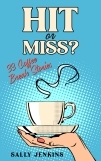 Hit or Miss?
Hit or Miss?
If short stories for adults are more your thing, you might fancy dipping into my new coffee break story collection: Hit or Miss? 33 Coffee Break Stories. Can you spot which stories were successful in securing magazine publication or competition success and which failed to land on the right desk at the right time?
November 8, 2022
A Book Contract!
Regular readers of this blog will know that I’ve had an up and down journey over the past few years in my quest to see my commercial women’s fiction novels published. You can read about some of it here and here.
Now, finally, some good news: I have signed a 3-book contract with Ruby Fiction and the first book (provisionally titled The Museum of Hope, but that might change) will be out sometime next year. Ruby Fiction is the sister imprint of Choc Lit, which publishes stories with romance at the heart. Ruby Fiction publishes women’s fiction such as thrillers, saga, mystery, chick lit, historical, fantasy, etc.
Ruby Fiction and Choc Lit are different from most publishers because all submitted manuscripts are reviewed, in the first instance, by their Tasting Panel who are genuine readers. I was overjoyed when I was told that The Museum of Hope had done well with the panel and the readers felt it was a unique story.
I have been made very welcome by my fellow Ruby & Choc Lit authors within their private Facebook Group and am now looking forward to working with Ruby’s editors and sharing the finished books with you!
And a reminder: if you’re looking for Christmas stocking fillers or secret-santa presents, my latest short story collection, Hit or Miss, is now available in paperback, on Kindle and on Kobo. 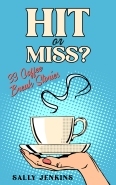
Challenge yourself! Which of these short stories were competition or magazine hits and which failed to land on the right editor’s desk at the right time?
October 28, 2022
Short Story Writing Tips & a Launch!
I’ve been busy with the feather duster in my Dropbox repository and have rediscovered several of my favourite short stories that missed their target. These are the stories which didn’t land on the right editor’s desk at the right time or failed to catch the imagination of a competition judge.
 This exercise made me think about two things: What are the best tips or rules for short story writing? And how can I best utilize these short story ‘misses’ in this age of recycling and ‘waste not want not’?
This exercise made me think about two things: What are the best tips or rules for short story writing? And how can I best utilize these short story ‘misses’ in this age of recycling and ‘waste not want not’?
Here are the five top short story writing tips I came up with:
1. Have only a few characters. Any more than three or four makes it difficult for the reader to get to know them in a short space of time. Make sure all their names begin with a different letter – this makes it easier for the reader to differentiate between them. Don’t give names to ‘walk-on’ characters such as the postman or policeman – this will only add to any confusion in the reader’s mind.
2. Be clear whose story it is i.e., from which character’s point of view are you telling the story. That person should have the most to gain/lose from the action. Ensure the reader becomes emotionally invested in that person.
3. Have the action take place in a short timescale. Focusing on a single moment in time works best because the story is ‘immediate’. Avoid a long buildup of backstory. If back story is essential, drop it concisely alongside the action.
4. Conflict should be at the centre of the story. The main character should be facing a dilemma or decision of some kind. This character should solve the dilemma himself rather than have it sorted out by someone else, coincidence or fate.
5. Edit! Give the story more impact by removing words like ‘very’ and ‘just’. Replace adverbs with more specific verbs, for example ‘run fast’ becomes ‘sprint’. Combine characters, for example does the heroine need two friends or will one work just as well and make the story neater?
And what’s happening to those short story ‘misses’? They are now getting their fifteen minutes of fame in Hit or Miss? 33 Coffee Break Stories. 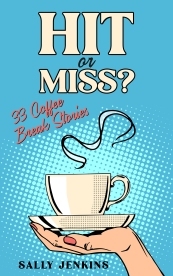 I’ve mixed the stories up with others that DID land on the right editor’s or judge’s desk at the right time, and I challenge YOU to decide which were hits and which missed their target.
I’ve mixed the stories up with others that DID land on the right editor’s or judge’s desk at the right time, and I challenge YOU to decide which were hits and which missed their target.
Hit or Miss? 33 Coffee Break Stories is now available on Kindle, in paperback from Amazon and on Kobo.
It would be lovely to get the comments started on the book’s Amazon/Kobo Review pages to indicate whether or not you agreed with those editors and judges.
October 5, 2022
Book Reviewing Opportunities
If you like reading new books by indie authors this could be the opportunity for you:
Reedsy Discovery is recruiting reviewers. The main Reedsy website is full of resources and freelance services aimed at helping writers at all stages of their journey to publication. Reedsy Discovery is an offshoot of this and is designed to spotlight the gems of the indie publishing world. The reviewers on Reedsy Discovery help to identify these gems. Reviewers are unpaid but they do have the opportunity to monetise their reading by accepting tips from people who find their reviews useful.
Interested? Visit the Reedsy website to find out more and to apply.
If you fancy finding out what it’s like to be a competition judge, The Highland Book Prize, uses keen

The Scottish Highlands
readers from the general public as initial readers. Readers provide a report and scores for each of the books they read and these are then used to compile the longlist for the Prize. Reading for the longlist takes place between July and September each year and has just finished for 2022. However, you can apply now to be on the panel next year. I have now been involved in this for three years and previously blogged about the experience.
Finally, if you enjoy blogging, tweeting and generally shouting about the books you’ve read, NetGalley might be the site for you. Publishers and authors distribute digital review copies and audiobooks to the NetGalley community, and in exchange, members provide reviews, star ratings, social media posts etc. Some publishers on NetGalley will vet reviewers before releasing ARCs (Advance Review Copies) but others are happy for their books to be read more widely. Register online to be a NetGalley reviewer.
Note: In all three cases above, the books are supplied in digital format, i.e. not paper books.
September 22, 2022
Short Story Ideas Generator
I’m on a mission to gather 30 short story ideas before the end of October. I will then write one 1700-word story per day through the 30 days of November, harnessing the global enthusiasm for NaNoWriMo (National Novel Writing Month) to keep me going. Purists may argue that writing short stories rather than novels for NaNoWriMo is cheating but for me, as long as I’m in the groove and aiming for 50,000 words, it doesn’t matter – it’s not a competition and no one is giving out prizes.
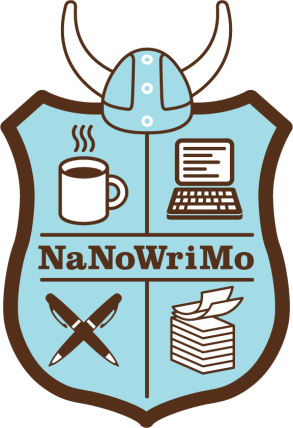
Image Courtesy of NaNoWriMo
How do I come up with 30 short story ideas?
So far, I’ve amassed 14 and used a variety of means. There were a few ideas floating in my head anyway, a friend sent me a page of prompts used by her poetry society, I took inspiration from all the recent royal coverage, and I discovered this online short story generator. Fill in the form to customise the story or take the option to fill the form with random things, then let the generator do its stuff.
Warning: the story will be nonsense. However, the first time I used it the opening sentence triggered an idea for me and the second time around it produced an intriguing title.
Might be worth a try if you’ve got a blank piece of paper and an empty mind?
For anybody not familiar with NaNoWriMo, the 30 stories I write will be very rough drafts, time doesn’t permit anything else. From December onwards they will need to be worked upon, crafted to the right length to suit the prospective market and then submitted gradually next year.
Whatever you choose to write in November, it only generates a starting point to be worked on over future months. It is never an endpoint in itself.
September 14, 2022
Calling Rejected Poets!
Have you ever had a poem rejected by a magazine? Do you have the rejection letter to prove it?
If so, here’s the perfect competition for you:
The Onwords website is running a free-to-enter competition for rejected poems with a first prize of $100, second prize of $50 and three honourable mentions winning $25 each.
The competition is open to submissions for two weeks only: 16 – 30 September 2022 and each poem must be accompanied by a screenshot of its rejection letter.
Full details of the competition are on the Onwords website.
September 8, 2022
What I Did on My Holidays
You don’t have the slightest interest in what I, or anyone else, did on their holidays but please bear with me – there is a literary slant to what I have to say, plus it saves me having to write a book, which I did in 2013 and 2021.

Big Water of Fleet Viaduct
This year we drove from the Midlands to Kirkcudbright in Dumfries and Galloway. En route we stopped for coffee in Sedbergh: England’s Official Book Town. Sedbergh is a small place where many of the independent shops have added the sale of secondhand books to their wares. The big attraction for me was Westwood Books which has a stock of over 70,000 titles – antiquarian, secondhand, and some new books. I was tempted by a copy of The Seven Sisters by Lucinda Riley which has been strongly recommended by my sister-in-law. But it’s a very thick book and I have a long TBR list, so I resisted the urge.
On arrival in Kirkcudbright we discovered that Dumfries and Galloway has its own literary connections. It was the setting for The 39 Steps by John Buchan and the viaduct in the photo was used in one of the film versions of the story. And Five Red Herrings, a murder mystery by Dorothy L Sayers, is set in Kirkcudbright itself and the 4-part serial is available on YouTube.
What did we actually do on holiday? Walking, a guided tour plus afternoon tea at Buittle Castle (both were excellent), walking, Raymond Briggs retrospective exhibition at Kirkcudbright Art Galleries, walking, Kirkcudbright Annual Tattoo (marching bands and a stunt motor cyclist!), walking and Kirkcudbright Art Tour.

Kirkcudbright Tattoo
Well done – you made it to the end of my holiday essay!
Finally, you might be interested in this crime writing short story competition. It closes 23rd January 2023 but there’s a reduced early bird entrance fee of only £3 if you enter before 1st December 2022.
August 16, 2022
Two Free Writing Competitions
Thank goodness the heatwave in the UK is diminishing. It seemed to sap all my energy and brain power. As I cool down, my thoughts are getting back into some sort of order and I’ve found two free competitions with generous cash prizes. They might be worth a try if you’re feeling creative.
The inaugural Patricia Eschen Prize for Poetry 2022 is open for entries.
Poems can be on any subject, up to a maximum length of 40 lines. Entry is free and limited to one entry per person. First prize is a massive £1,000, second prize is £500 and third prize is £300.
Closing date is Friday 30th September 2022.
The Secret Life of Data Short Story Competition is being run by Bristol University. The website says, “this secret life of data – the traces, bits, and fragments of personal information that we leave behind us online – is the focus of this short story competition.”
Maximum word count is 4,000 and any style or genre is acceptable. Prizes are: 1st – £1000, 2nd – £500, 3rd – £250. The ten shortlisted stories will be published in the Secret Life of Data Anthology in both print and ebook formats plus there will be an Awards Ceremony in Bristol.
Closing date 9am (BST) Monday 12th September 2022 and entry is free.
This timid little fellow belonging to one of our neighbours didn’t like the heat either and flaked out in any shade he could find. 